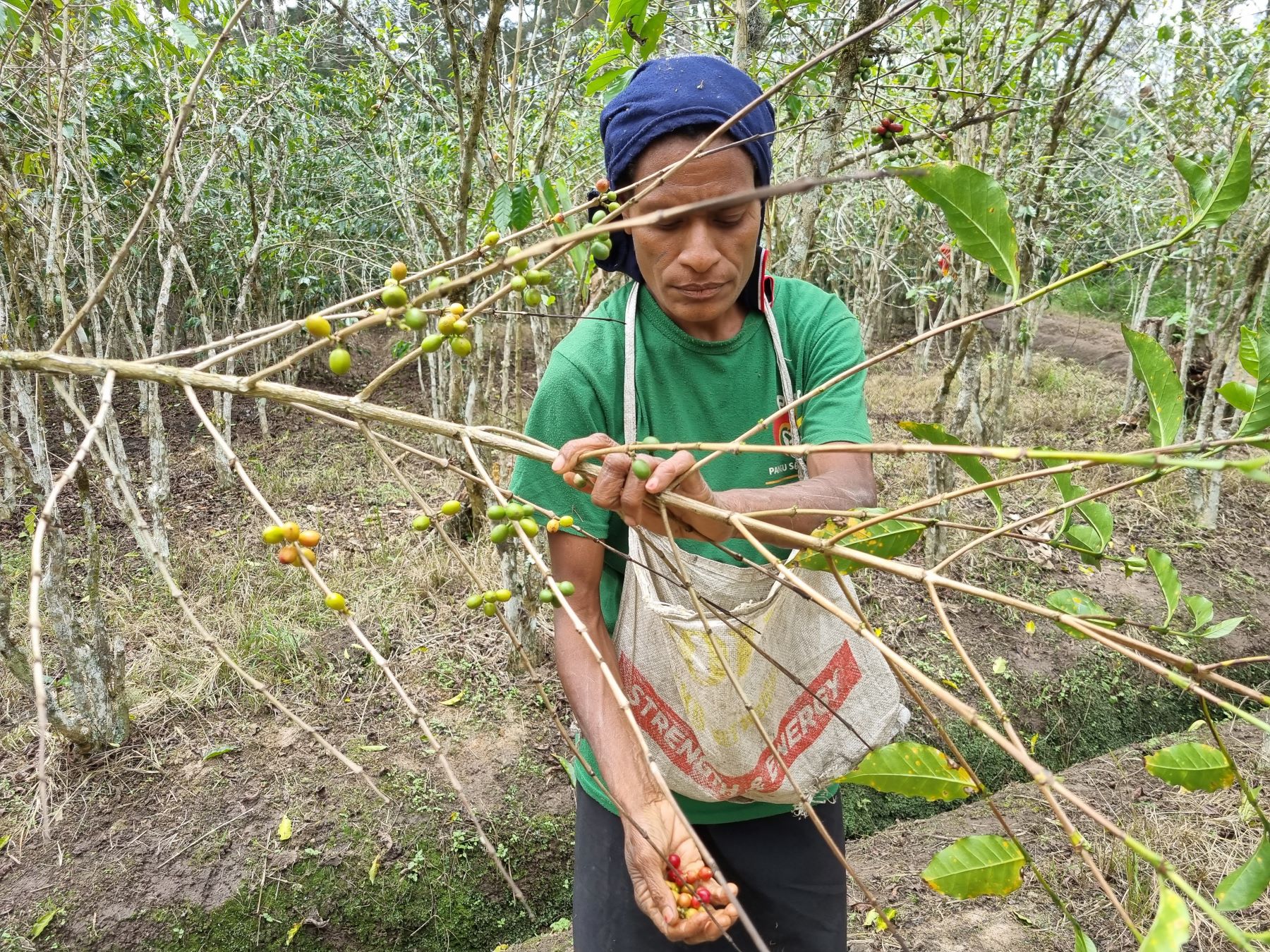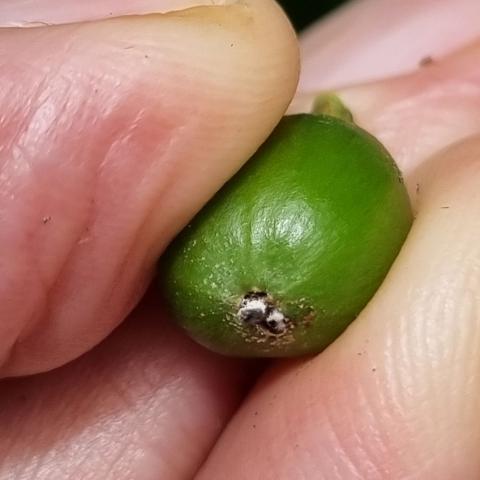Although just 1.5 mm in size, coffee berry borer (CBB) is the most serious and widespread pest to coffee production around the world.
The tiny pest is not yet in Australia, but it has recently been detected in neighbouring Papua New Guinea (PNG), where many villages and smallholder farmers rely on the coffee crops for their livelihoods.
Female borers breed in mature coffee berries, moving from one to the next, leaving only small holes in the berries as evidence of their presence. The borers consume the beans, reducing the yield of harvestable berries and reducing the value of the crop. It can infest up to 95% of unmanaged crops.

Raising awareness and reducing pest numbers
An ACIAR-supported project, Protecting the coffee industry from coffee berry borer in Papua New Guinea and Australia, is working with both countries to develop sustainable pest management strategies.
Dr Ian Newton, principal entomologist with the Queensland Department of Primary Industries, is leading the project, which has a 2-pronged approach.

The first is to raise awareness of CBB's significance as a biosecurity risk and implement cultural practices to limit the movement of the pest. The second is to research new biopesticides to reduce the pest numbers.
Dr Newton said the most effective way to control CBB to date has been cultural practices.
'In Papua New Guinea, coffee is the backbone economy for many villages, so giving them the tools to maximise their harvest and minimise the spread of CBB is vital,' he said.
'We developed and demonstrated a best management package that gives growers the tools to understand how to reduce CBB damage by using cultural practices such as regular harvesting and complete removal of infected berries. It requires no additional monetary input but has the potential to realise better economic returns for their communities.'
Dr Newton said a biopesticide that incorporates a local strain of the Beauveria fungus, which can kill CBB, has also shown some promise in reducing pest numbers.
Biosecurity message for Australian growers
By international standards, Australia's coffee industry is very small. However, Australia is one of a few growing locations that is free from coffee berry borer.
As the Australian coffee industry expands, the risk of a CBB incursion grows. The pest spreads quickly in ripe berries and could potentially hitch a ride on imported beans to threaten domestic crops. CBB has already been designated as a pest of national importance.
In Australia, the ACIAR-supported research team has collaborated with AgriFutures Australia to run workshops, raising awareness of the CBB threat with domestic growers. Extension materials for growers are based on the experience developed from working in PNG.
'Identification of the coffee berry borer for Australian growers has been quite beneficial, to differentiate it from native borers,' said Ms Rebecca Zentveld, president of the Australian Grown Coffee Association.
Australia is very lucky to not have CBB, and that is in part due to our biosecurity measures at the border, but as an industry, it is so important that we keep it that way. The extension workshops have been integral to making sure our growers are informed.
'We are incorporating Dr Newton's CBB identification poster as a supplement to the Australian Coffee Growers' Manual and on our industry website. We will also be looking to establish an emergency pest response plan later in the year.
'We are excited to see the development of the Beauveria fungi becoming a natural biopesticide for CBB, should it ever arrive in Australia. It sounds promising for Australian growers,' said Ms Zentveld.
Biopesticides research extends beyond coffee
Part of the CBB research has involved researching strains of the insect-killing fungi Beauveria and Metarhizium in PNG and Australia for use in biopesticides. These have proved promising against CBB and other pests.
When the highly destructive fall armyworm arrived in Australia in 2020, the biopesticide research was expanded to fall armyworm and other pest species.
Prevalent around the world, fall armyworm is devastating to maize and sweetcorn crops and, to a lesser extent, crops such as sorghum, rice, millet, oats, wheat, fodder and hay crops.
'Our initial trials research showed that Metarhizium rileyi was very effective against fall armyworm,' said Dr Newton.
'Our next phase is to assess different fungal strains, biopesticide formulations and production efficiency to give growers another tool against fall armyworm.'
With fall armyworm recently moving across Africa, Asia and the Pacific, and the pest's increasing resistance to available pesticides, the ACIAR-supported biopesticide research has far-reaching implications for growers around the world.
The biopesticides have also proven effective against other crop pests including banana-spotting bugs and Queensland fruit fly.
ACIAR Research Program Manager, Horticulture, Dr Sandra McDougall said projects such as the CBB project highlight the benefits of agility in research and working with partners.
'This project started out focusing only on coffee berry borer, but the biopesticide research expanded when fall armyworm arrived in Australia. Some of the strengths of ACIAR are its flexibility and partnerships with people such as Dr Newton and the Australian coffee industry, and it being able to act on an opportunity to benefit broader Australian agricultural industries through research.'
ACIAR Project: 'Protecting the coffee industry from coffee berry borer in Papua New Guinea and Australia' (HORT/2018/194)






